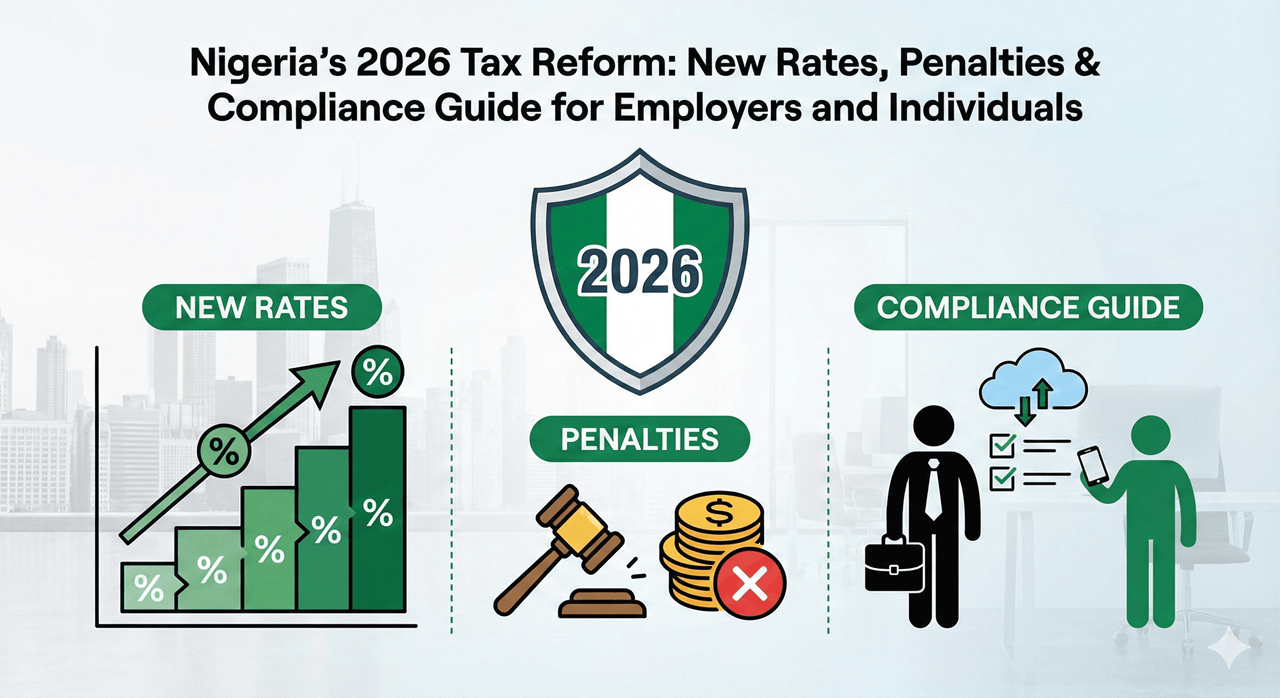Payroll Deadlines in Nigeria: A Guide for Timely and Accurate Payments

Payroll Deadlines in Nigeria: A Guide for Timely and Accurate Payments
Payroll deadlines in Nigeria are a critical consideration for global businesses, and expanding into the country is an exciting opportunity. With Africa’s largest economy, a population of over 200 million, and a rapidly growing digital sector, Nigeria offers unmatched potential for growth. Yet, one truth quickly becomes clear to every employer: payroll compliance is not optional—it’s the backbone of sustainable operations.
Between federal and state rules, overlapping deadlines, and frequent regulatory updates, Payroll deadlines in Nigeria can feel like a constantly shifting target. Missing a filing or remittance date doesn’t just inconvenience employees; it can lead to financial penalties, stalled contracts, and reputational damage that lingers long after the fine is paid.
This guide explores the statutory payroll obligations in Nigeria, the critical payroll deadlines in Nigeria you must never miss, the penalties for noncompliance, and the strategies businesses can adopt to stay compliant while focusing on growth.
Nigeria’s economic promise and the legal framework behind payroll
Nigeria’s pull factor and “selling point” lie in its scale and dynamism. It is home to one of the youngest populations in the world, with a median age under 19, and a consumer base that is increasingly digital-first. For companies entering this market, the opportunity is vast—but so is the responsibility to operate within the country’s legal framework.
Payroll and tax compliance in Nigeria are shaped by several key laws:
- Personal Income Tax Act (PITA): Governs Pay-As-You-Earn (PAYE) deductions from employee salaries.
- Pension Reform Act (PRA): Establishes mandatory pension contributions for both employers and employees.
- Industrial Training Fund (ITF) Act: Requires employers to contribute to workforce training and development.
- National Housing Fund (NHF) Act: Provides funding for affordable housing through employee contributions.
- NSITF Act: Covers workplace injury compensation through the Employees’ Compensation Fund.
The challenge for businesses is that these regulations are often fragmented. For example, PAYE remittance deadlines are sometimes cited as within 10 days of deduction, while other sources state the 14th of the following month. Similarly, the ITF threshold is inconsistently described as applying to companies with either 5 or 25 employees. This lack of a single, definitive source of truth creates uncertainty for foreign businesses relying solely on online research or internal teams.

Payroll Deadlines in Nigeria
Core Payroll Obligations: What Employers Must Know
Personal Income Tax (PAYE)
Employers are responsible for deducting PAYE tax from employee salaries and remitting it to the relevant state tax authority. The system is progressive, with rates ranging from 7% for annual incomes of ₦300,000 to 24% for those earning above ₦3.2 million.
- Deadlines: Monthly remittances must be made within 10 days of deduction, while annual returns are due by January 31.
- Penalties: Non‑compliance attracts a 10% penalty on unremitted tax plus interest at the Central Bank of Nigeria (CBN) rate. Companies also face fines of ₦500,000 for late annual returns, while individuals face ₦50,000. Perhaps most critically, failure to comply can result in the denial of a Tax Clearance Certificate (TCC), which is essential for bidding on contracts and expanding operations.
Pension Contributions (PRA 2014)
The Pension Reform Act requires employers to contribute 10% of an employee’s salary, while employees contribute 8%. These funds must be remitted to the employee’s Pension Fund Administrator (PFA) within seven days of salary payment.
- Penalties: A 2% penalty is applied for every month of default, and the regulator, PenCom, actively enforces compliance by appointing Recovery Agents to pursue defaulters. Beyond the financial risk, failure to remit pensions undermines employee trust and can damage a company’s reputation as an employer of choice.
Industrial Training Fund (ITF)
Employers are required to contribute 1% of their annual payroll to the ITF, which funds workforce training initiatives.
- Deadline: Contributions are due by April 1 each year.
- Threshold: The law is inconsistently interpreted, with some sources applying it to companies with 5 employees or ₦50 million turnover, while others cite 25 employees.
- Penalties: Non‑payment attracts a 5% monthly interest charge. However, compliant employers can benefit from up to a 50% refund if they run approved training programs, making this obligation both a cost and an opportunity.
National Housing Fund (NHF)
Employees are required to contribute 2.5% of their monthly income to the NHF, which supports affordable housing initiatives. Employers must deduct and remit these contributions alongside payroll.
- Penalties: Companies that fail to comply face fines of ₦50,000, while officers responsible may face ₦20,000 fines or imprisonment.
National Social Insurance Trust Fund (NSITF)
Employers must contribute 1% of their total monthly payroll to the Employees’ Compensation Fund, which provides insurance coverage for workplace injuries.
- Deadline: Contributions are due monthly.
Penalties: A 10% surcharge is applied to unpaid assessments, and persistent non‑compliance can trigger legal action.

Strategies for Staying Compliant
Partnering with an Employer of Record (EOR)
For foreign businesses, one of the most effective ways to manage payroll compliance is to partner with an Employer of Record (EOR) such as Remote Solutions Africa. An EOR acts as the legal employer, handling payroll, tax filings, and compliance on behalf of the company.
This approach offers several advantages:
- Speed: Market entry in weeks rather than months.
- Cost efficiency: Avoids the expense of setting up a local entity.
- Risk transfer: The EOR assumes legal liability for compliance.
To avoid co‑employment risks, contracts should clearly state that the EOR is the sole legal employer.
Best Practices for Payroll Management
- Maintain a compliance calendar: Track all statutory deadlines in one place.
- Use payroll software with compliance features: Automate calculations and reminders.
- Segregate duties: Ensure payroll processing and approvals are handled by different teams.
- Conduct regular audits: Identify and correct errors before they escalate.
Leverage local expertise: Partner with advisors who understand the nuances of Nigerian law.

Looking Ahead: The Nigeria Tax Act 2025
In June 2025, Nigeria passed the Nigeria Tax Act (NTA), a sweeping reform expected to take effect in January 2026. The Act consolidates multiple tax laws into a single statute, introduces revised progressive income tax rates (0–25%), and raises the exemption threshold to ₦800,000 for low‑income earners. It also introduces a new 4% Development Levy on companies and imposes tougher penalties for late filing—₦100,000 for the first month and ₦50,000 for each subsequent month.
For businesses, the message is clear: Nigeria’s tax environment is becoming more centralized, stricter, and less forgiving. Companies that prepare now will avoid disruption when the law takes effect.
Conclusion: Compliance as a Growth Enabler
Nigeria offers extraordinary opportunities for businesses willing to invest in its market. But growth is only sustainable when payroll compliance is treated as a priority. Missing payroll deadlines in Nigeria can cost more than money—it can cost credibility, contracts, and long‑term success.
To stay ahead, businesses should:
- Build a clear payroll calendar and remit early. Tracking all statutory payroll deadlines in Nigeria ensures that companies avoid penalties and maintain smooth operations.
- Partner with trusted local experts or an Employer of Record (EOR). These professionals understand the nuances of Nigerian tax laws and can help businesses meet critical payroll deadlines in Nigeria without confusion.
- Begin preparing now for the Nigeria Tax Act 2025. This reform will consolidate multiple tax laws, introduce stricter penalties, and make compliance even more time‑sensitive. Companies that anticipate changes will be better positioned to meet future payroll deadlines in Nigeria.
Payroll compliance is not a formality—it is the foundation of smooth operations in one of Africa’s most dynamic markets. Companies that master payroll deadlines in Nigeria will not only avoid penalties but also earn the trust of employees, regulators, and partners, unlocking Nigeria’s full potential.




































